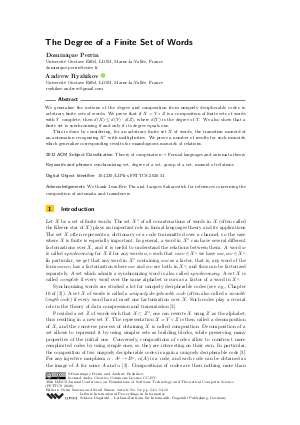The Degree of a Finite Set of Words
Authors
Dominique Perrin,
Andrew Ryzhikov 
-
Part of:
Volume:
40th IARCS Annual Conference on Foundations of Software Technology and Theoretical Computer Science (FSTTCS 2020)
Part of: Series: Leibniz International Proceedings in Informatics (LIPIcs)
Part of: Conference: IARCS Annual Conference on Foundations of Software Technology and Theoretical Computer Science (FSTTCS) - License:
 Creative Commons Attribution 3.0 Unported license
Creative Commons Attribution 3.0 Unported license
- Publication Date: 2020-12-04
File

PDF
LIPIcs.FSTTCS.2020.54.pdf
- Filesize: 0.53 MB
- 16 pages
Document Identifiers
Subject Classification
ACM Subject Classification
- Theory of computation → Formal languages and automata theory
Keywords
- synchronizing set
- degree of a set
- group of a set
- monoid of relations
Metrics
- Access Statistics
-
Total Accesses (updated on a weekly basis)
0Document
0Metadata
Abstract
We generalize the notions of the degree and composition from uniquely decipherable codes to arbitrary finite sets of words. We prove that if X = Y∘Z is a composition of finite sets of words with Y complete, then d(X) = d(Y) ⋅ d(Z), where d(T) is the degree of T. We also show that a finite set is synchronizing if and only if its degree equals one. This is done by considering, for an arbitrary finite set X of words, the transition monoid of an automaton recognizing X^* with multiplicities. We prove a number of results for such monoids, which generalize corresponding results for unambiguous monoids of relations.
Cite As Get BibTex
Dominique Perrin and Andrew Ryzhikov. The Degree of a Finite Set of Words. In 40th IARCS Annual Conference on Foundations of Software Technology and Theoretical Computer Science (FSTTCS 2020). Leibniz International Proceedings in Informatics (LIPIcs), Volume 182, pp. 54:1-54:16, Schloss Dagstuhl – Leibniz-Zentrum für Informatik (2020)
https://doi.org/10.4230/LIPIcs.FSTTCS.2020.54
BibTex
@InProceedings{perrin_et_al:LIPIcs.FSTTCS.2020.54,
author = {Perrin, Dominique and Ryzhikov, Andrew},
title = {{The Degree of a Finite Set of Words}},
booktitle = {40th IARCS Annual Conference on Foundations of Software Technology and Theoretical Computer Science (FSTTCS 2020)},
pages = {54:1--54:16},
series = {Leibniz International Proceedings in Informatics (LIPIcs)},
ISBN = {978-3-95977-174-0},
ISSN = {1868-8969},
year = {2020},
volume = {182},
editor = {Saxena, Nitin and Simon, Sunil},
publisher = {Schloss Dagstuhl -- Leibniz-Zentrum f{\"u}r Informatik},
address = {Dagstuhl, Germany},
URL = {https://drops.dagstuhl.de/entities/document/10.4230/LIPIcs.FSTTCS.2020.54},
URN = {urn:nbn:de:0030-drops-132952},
doi = {10.4230/LIPIcs.FSTTCS.2020.54},
annote = {Keywords: synchronizing set, degree of a set, group of a set, monoid of relations}
}
Author Details
Acknowledgements
We thank Jean-Eric Pin and Jacques Sakarovitch for references concerning the composition of automata and transducers.
References
-
Timothy C. Bell, John G. Cleary, and Ian H. Witten. Text compression. Prentice-Hall, Inc., 1990.

- Jean Berstel, Dominique Perrin, Jean-Francois Perrot, and Antonio Restivo. Sur le théorème du défaut. Journal of Algebra, 60(1):169-180, 1979. URL: https://doi.org/10.1016/0021-8693(79)90113-3.
-
Jean Berstel, Dominique Perrin, and Christophe Reutenauer. Codes and Automata. Cambridge University Press, 2009.

- Renato M. Capocelli, Luisa Gargano, and Ugo Vaccaro. A fast algorithm for the unique decipherability of multivalued encodings. Theoretical Computer Science, 134(1):63-78, 1994. URL: https://doi.org/10.1016/0304-3975(94)90278-X.
- Arturo Carpi and Flavio D'Alessandro. On incomplete and synchronizing finite sets. Theor. Comput. Sci., 664:67-77, 2017. URL: https://doi.org/10.1016/j.tcs.2015.08.042.
- Julien Clément, Jean-Pierre Duval, Giovanna Guaiana, Dominique Perrin, and Giuseppina Rindone. Parsing with a finite dictionary. Theoretical Computer Science, 340(2):432-442, 2005. URL: https://doi.org/10.1016/j.tcs.2005.03.030.
- Aldo de Luca, Dominique Perrin, Antonio Restivo, and Settimo Termini. Synchronization and simplification. Discrete Mathematics, 27(3):297-308, 1979. URL: https://doi.org/10.1016/0012-365X(79)90164-X.
-
Samuel Eilenberg. Automata, Languages and Machines, volume A. Academic Press, 1974.

-
Samuel Eilenberg. Automata, Languages and Machines, volume B. Academic Press, 1976.

- Fernando Guzmán. Decipherability of codes. Journal of Pure and Applied Algebra, 141(1):13-35, 1999. URL: https://doi.org/10.1016/S0022-4049(98)00019-X.
- Tero Harju and Juhani Karhumäki. Many aspects of defect theorems. Theoretical Computer Science, 324(1):35-54, 2004. Words, Languages and Combinatorics. URL: https://doi.org/10.1016/j.tcs.2004.03.051.
- Evelyne Le Rest and Michel Le Rest. Une représentation fidèle des groupes d'un monoïde de relations binaires sur un ensemble fini. Semigroup Forum, 21(2-3):167-172, 1980. URL: https://doi.org/10.1007/BF02572547.
- Abraham Lempel. On multiset decipherable codes (corresp.). IEEE Trans. Inf. Theor., 32(5):714-716, 1986. URL: https://doi.org/10.1109/TIT.1986.1057217.
-
J.S. Montague and R.J. Plemmons. Maximal subgroups of the semigroup of relations. Journal of Algebra, 13(4):575-587, 1969.

-
H. Nagumo, Mi Lu, and Karan Watson. Parallel algorithms for the static dictionary compression. In Proceedings DCC '95 Data Compression Conference, pages 162-171, 1995.

-
R. J. Plemmons and M. T. West. On the semigroup of binary relations. Pacific J. Math., 35(3):743-753, 1970.

-
Evelyne Barbin-Le Rest and Stuart W. Margolis. On the group complexity of a finite language. In Proceedings of the 10th Colloquium on Automata, Languages and Programming, pages 433-444, Berlin, Heidelberg, 1983. Springer-Verlag.

- Antonio Restivo. A note on multiset decipherable codes. IEEE Trans. Inf. Theor., 35(3):662-663, 1989. URL: https://doi.org/10.1109/18.30991.
-
Jacques Sakarovitch. Elements of Automata Theory. Cambridge University Press, 2009.

-
Marcel-Paul Schützenberger. A property of finitely generated submonoids of free monoids. In G. Pollak, editor, Algebraic Theory of Semigroups, pages 545-576. North-Holland, 1979.

-
Andreas Weber and Tom Head. The finest homophonic partition and related code concepts. IEEE Transactions on Information Theory, 42(5):1569-1575, 1996.

